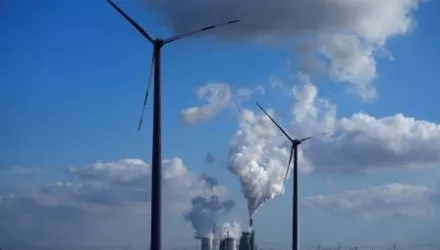BCSIA: 1977-1978 ANNUAL REPORT
3. Research and Publications
RESEARCH AND PUBLICATIONS
The principal activity of the Program continued to be the performance of research on arms control and disarmament and the part these can play in reducing the dependence on force in world politics. Listed below are brief summaries of the primary research interests of members of the staff and reference data for works they published during 1977-78.
Research Interests
Carlos A. Astiz, Research Fellow, PSIA (Spring Term). Foreign policies of major countries of Latin America with special reference to Brazil and to nuclear proliferation. (On leave from State University of New York at Albany.)
Hans Gunter Brauch, Research Fellow, PSIA (Spring Term). United States relations towards the Soviet ''Union during the past decade, focusing on detente, SALT, trade and technology transfer, and scientific exchanges; theatre nuclear weapons and enhanced radiation warheads.
Albert Carnesale, Associate Director, PSIA, and Lecturer in Public Policy. Nuclear energy policy, nuclear arms control, and the relationships between them, with emphasis on technical and political relationships between the global spread of nuclear power reactors (and associated fuel cycle facilities) and the proliferation of nuclear weapons.
Steven David, Graduate Student in Government. Patterns of changing alignment among states, focusing on the African Horn, Cuba, and the Middle East.
David A. Deese, Research Fellow, PSIA. U.S. executive congressional relations and roles in formulating foreign policy; international relations issues arising from the interaction of energy, security, and environment; nuclear nonproliferation and international political and institutional aspects of controlling the nuclear fuel cycle; and science, technology, and the future of the ocean.
Paul Doty, Director of PSIA, and Mallinckrodt Professor of Biochemistry. Soviet-American relations and strategic arms control; relations of national science policies to foreign policy objectives; international scientific cooperation.
Stephen J. Flanagan, Graduate Student, The Fletcher School of Law and Diplomacy. The role of Congress in the formulation of U.S. foreign and defense policy, with particular reference to SALT; the CSCE and European security issues; European arms transfer policies.
Randall Forsberg, Graduate Student, Massachusetts Institute of Technology. Composition of U.S. and foreign military budgets; trends in world military R&D; components of world military forces since 1900; political analysis of differences between use of military force for defense and deterrence and use as a tool of foreign policy; assessment of desirability and feasibility of disarmament.
Robert L. Gallucci, Research Fellow, PSIA (Fall Term). European nuclear energy policy and its relationship to nonproliferation policies.
Thane Gustafson, Research Fellow, PSIA, and Assistant Professor of Government. The politics of scientific research and technological innovation in the United States and the Soviet Union; the capacity of the Soviet political system to cope with a serious crisis, specifically the disastrous consequences for agriculture and the environment of two generations of forced-draft heavy industrialization.
Tariq Osman Hyder, Honorary Research Fellow, PSIA, and Visiting Scholar at Harvard Law School. Interaction of disarmament negotiations with the evolving position of the developing countries. (on leave of absence from Ministry of Foreign Affairs, Pakistan.)
Victoria Johnson, Graduate Student, Tufts University. Brazilian nuclear development; intent and capabilities.
F. Stephen Larrabee, Research Fellow, PSIA. Soviet policy; regional security problems in the Eastern Mediterranean.
Derek Leebaert, Research Fellow, PSIA, and Managing Editor of International Security. Future influences on European defense, conventional weapons (transfers and training); and the general security considerations of U.S. foreign policy.
Michael Mandelbaum, Research Fellow, PSIA, and Assistant Professor of Government. The impact of nuclear weapons on international politics.
Onkar S. Marwah, Research Fellow, PSIA. The nuclear programs of seven developing countries (Argentina, Brazil, India, Iran, Pakistan, South Korea, Taiwan); nuclear technology export restrictions and related concerns; arms control and stability in the Indian Ocean region; conventional arms procurement in South Asia; conceptual models of regional deterrence.
Robert S. Metzger, Research Fellow, PSIA. "Gray area systems," involving the interaction between European security concerns and strategic arms limitations; evaluation of Arms Control Impact Statement Legislation; trends in conventional arms technology with a view to implications of such on MBFR; details and implications of the SALT II negotiations.
Linda Miller, Research Fellow, PSIA, and Professor of Political Science, Wellesley College. The politics of energy, especially the impact of resource problems on the relations of advanced industrial countries; U.S. policy in the Middle East.
Steven E. Miller, Graduate Student, The Fletcher School of Law and Diplomacy. Soviet foreign policy (particularly U.S.-Soviet relations); strategic arms control; U.S. defense policy and European politics; conventional arms transfers.
Michael Nacht, Assistant Director, PSIA, and Lecturer in Public Policy. Soviet-American nuclear relations and problems of strategic arms control; issues in nuclear nonproliferation policy, and the influence of the Vietnam experience on American foreign policy.
Jonathan D. Pollack, Research Fellow, PSIA. China as a world power; Chinese security in transition; the future of Sino-Soviet relations; security and arms control in Northeast Asia.
Stephen Sestanovich, Graduate Student in Government. Nuclear proliferation and Soviet foreign policy; strategic arms control; and American alliance politics.
Gene Sharp, Research Fellow, PSIA, and Professor of Political Science and Sociology at Southeastern Massachusetts University. Nonviolent and violent sanctions applied as punishments, means of struggle, and combat by both non-State groups and States.
Jane M.O. Sharp, Graduate Student, Graduate Institute for International Studies, Geneva. Arms control diplomacy and military force planning, with particular reference to force improvements in NATO and the Warsaw Pact since 1968; attitudes and goals of UN members to the 1978 UN Special Session on Disarmament; potential for national initiatives in disarmament as distinct from negotiated measures.
David W. Tarr, Research Fellow, PSIA (Fall Term). Strategic weapons arms control and disarmament options in medium and long-term future, with particular stress on alternatives to dependence on nuclear deterrence. (On leave from the University of Wisconsin/Madison.)
Alex A. Vardamis, Research Fellow, PSIA. U.S. tactical nuclear weapon support of NATO; the future of U.S.-F.R.G. military affairs; and the armed forces of the Federal Republic of Germany.
Paul F. Walker, Research Fellow, PSIA. Arms control and disarmament; Soviet foreign military policy; military spending; bureaucratic decisionmaking; peacekeeping; arms transfers; and international relations and foreign policy in general.
Marilyn Z. Wellons, Graduate Student, Columbia University. Command, control, and communications; theater nuclear weapons; and current debates about the strategic balance.
Frederick C. Williams, Research Fellow, PSIA. Institutional and legal aspects of nonproliferation and nuclear energy.
Dorothy Zinberg, Director of Seminars and Special Projects, PSIA. Study of post-doctoral science research abroad; foreign research activities of National Academy of Science members; the role of scientists and technologists in the nuclear energy debate.
Publications
Astiz, Carlos A. "The Future of Legislatures in Latin America." Parliamentary Affairs (London) 30 (Autumn 1977).
_____. "U.S. Policy and Latin American Reaction." Current History 74:49-52, 89.
Brauch, Hans GUnter. "Entwicklungen and Ergebnisse der Friedensforschung (III)." Neue Politische Literatur [XXII/4 (1977)].
_____. "Entwicklungen und Ergebnisse der Friedensforschung (IV)." Neue Politische Literatur IXXII,1/1(1978) in press.
_____. "Die Neue Weltwirtschaftsordnung und die USA: Die VorschlHge nicht-staatlicher Organisationen." Au~enpolitik (2/1978), in press.
_____. "Abrustungen der Bundesregierung - Ein Vorschlag fur eine aktive Friedenspolitik." Aus Politik und Zeitqflschichte. Beilage zur Wochenzeitung Das Parlament, B8/78, February 25, 1978.
_____. "Neutronenwaffe filr AbrUstungsinitiative nutzen." Neue Politik. February 15, 1978,
_____. "Siebente Generalkonferenz der Friedensforscher in Maxiko: Militarismus und neue Weltwirtschaftsordnung.11 Vorwarts (January 19, 1978) No. 3.
_____. "Eine ''saubere'' Waffe wirbelt Stauf auf. Auch in den Vereinigten Staaten ist die Neutronenwaffe umstritten.11 Vorwarts (March 23, 1978).
_____. "Dependenztheorie und AbhHngigkeit in Latein-amerika." Neue Politische Literatur IXXIII/2(1978)] in press.
_____. "Enhanced Radiation Warhead - A West German Perspective." Arms Control Today (May 1978).
_____. "Hanspeter Neuhold: Internationale Konflikte Verbotene und erlaubte Mittel ihrer Austragung." Zeitschrift fu"r auslandisches offentliches Recht und Volkerrecht (1978), in press (review).
Carnesale, Albert. "Nuclear power and nuclear proliferation." Kennedy School Bulletin (Winter 1977).
_____. "Nuclear power and nuclear proliferation." In Options for U.S. Energy Policy. San Francisco: Institute for Contemporary Studies, 1977.
Deese, David A. Nuclear Power and Radioactive Waste: A Sub-seabed Disposal Option? Lexington, Massachusetts: D.C. Heath & Company, 1978.
Flanagan, Stephen J. "The CSCE and the Development of European Security: The Outlook After Belgrade." In European Security: Prospects for 1980s edited by Derek Leebaert. Lexington, Massachusetts: D.C. Heath & Company. Forthcoming.
Forsberg, Randall, et al. The Price Of Our Defense. New York: New York Times Publishing Company. Forthcoming.
Gustafson, Thane. "The New Soviet Environmental Policy: Do the Soviets Really Mean Business?" Public Policy (Summer 1978).
_____. "The Rise of an Environmental Protest Movement in Russia." In Public Controversies over Technical Issues edited by Dorothy Nelkiln. Forthcoming.
_____. "Transforming Soviet Agriculture: Brezhnev''s Gamble on Reclamation." Public Policy (Summer 1977).
_____. "Why is the Soviet Union Behind the United States in Science?" In The Social Context of Soviet Science edited by Susan G. Solomon and Linda Lubrano. Boulder, Colorado: Westview Press. Forthcoming.
_____. Review article on Brezhnev''s agricultural policy. Problems of Communism. Forthcoming.
Larrabee, F. Stephen. Balkan Section in Strategic Survey 1977. London: International Institute for Strategic Studies, 1978.
_____. "Bonn, Moscow and European Security." Problems of Communism. Forthcoming.
_____. "Instability and Change on NATO''s Southern Flank." In European Security: Prospects for the 1980s edited by Derek Leebaert. Lexington, Massachusetts: D.C. Heath & Co. Forthcoming.
_____. "National Defense: The Romanian View." Survival (March/April 1978).
_____. "Whither Albania?" The World Today February 1978.
Leebaert, Derek, ed. European Security: Prospects for the 1980s. Lexington, Massachusetts: D.C. Heath & Company. Forthcoming.
_____. Review of Power and Interdependence by Joseph Nye and Keohane. Survival (September/October 1977).
_____. Review of Shattered Peace by Daniel Yergin. Military Review, Fall 1978.
_____. Towards a Comprehensive U.S. Arms Control Strategy. Aspen Institute Monograph.
_____. "Trade Liberalization as a Path to Weapon Standardization in NATO." International Security 2, No. 3 (Winter 1978) .
Mandelbaum, Michael. "Clausewitz." The Yale Review (Summer 1977).
_____. "The Long Life of Liberalism." In The Relevance of Liberalism. Boulder, Colorado: Westview Press, 1978.
_____. "International Stability and Nuclear order: The First Nuclear Regime." In Nuclear Weapons and World Politics. New York: McGraw-Hill, 1977.
_____. and William Schneider. "The New Internationalisms." International Security 2, No. 3 (Winter 1978).
Marwah, Onkar. "India''s Military Intervention in East Pakistan, 1971." Modern Asian Studies. Cambridge, England: Cambridge University, 1978. 45 pp. Forthcoming.
_____. "India in the Indian Ocean." in Lawrence Ziring, ed., The Subcontinent in World Politics. New York: Praeger, 1978, 45 pp.
_____. "Military Power and Policy in India." In Onkar Marwah and Jonathan Pollacks, eds., Asia''s Major Powers. Boulder, Colorado: Westview Press, 1978. 75 pp.
_____. "Regional Storage of Spent Nuclear Fuel: The Indian Ocean Area." For ACDA-sponsored research contact with Harvard University''s Program for Science and International Affairs, entitled "International Cooperation in the Storage of Spent Nuclear Fuel." 23 pp.
_____. "Recent Trends in Indian Nuclear Policy." In John W. Mellor, ed., India: A Middle Power'' and'' the ''U.S. Interest. Boulder, Colorado: Westview Press, 197-9. 25 pp.''
_____. "Peace, War and Arms Control since 1945.1'' For volume to be published by the Centre for the Study of Developing Societies., Delhi, Workshop on Disarmament, March 27-31, 1978.45 pp.
_____. "Regional Conflicts, Security Concerns, and Arms Control: The Indian Ocean Vortex." Monograph (co-authored) October 1978. 50 pp.
_____. "India''s Perspectives on American-Soviet Naval Rivalry in the Indian Ocean Region." Aspen Institute for Humanistic Studies, Aspen, Colorado. Workshop on Naval Arms Control, August 6-11, 1978. 45 pp.
Metzger, Robert. "Cruise Missiles: Different Missions, Different Arms Control Impact." Arms Control Today
(January 1978).
_____. "Assessment of the Administration Decision Not to Prepare Impact Statements on 89 Weapon Systems and Programs." Joint Committee Print, Senate Foreign Relations Committee and House International Relations Committee (June 1978).
Miller, Linda. Review of The Politics of Oil by Robert Engler. Political Science Quarterly (Winter 1978).
_____. "America, Europe and the Energy-Security Dilemma." In European Security: Prospects for the 1980s edited by Derek Leebaert. D.C. Heath & Company. Forthcoming.
Miller, Steven and Geoffrey Kemp. "The Arms Transfer Phenomenon." Volume edited by Andrew Pierre. Forthcoming.
Nacht, Michael. "Arms and Politics: old Issues, New Perspectives." In David Carlton and Carlo Schaerf, eds., Arms Control and Technological Innovation. London, England: Croom Helm, 1977. pp. 161-169.
_____. "Global Trends in Nuclear Proliferation." In Insecurity: The Spread of Weapons in the Indian and Pacific Oceans edited by Robert O''Neill. Canberra, Australia: Australian National University Press, 1978.
_____. "International Arms Control: A Review." The Bulletin of Atomic Scientists (February 1978).
_____. "Nuclear Proliferation Problems: A Review." The American Political Science Review, December 1977, pp. 1756-1759.
Pollack, Jonathan. "China Reaches a Milestone." Boston Sunday Globe, Focus Section (July 31, 1977).
_____. "China and the Soviet Union in the Coming Decade." Proceedings of the Academy of Political Science (Winter 1978) and in The Soviet Threat - Myths and Realities edited by Grayson Kirk and Nils Wessel. New York and Washington: Praeger Publishers, 1978.
_____. "Han Suyin Reports on Conflict and Change in Post-Mao China." Politicks Magazine (January 3, 1978).
_____. "The Logic of Chinese Military Strategy." Bulletin of the Atomic Scientists (January 1979). In press.
_____. "The People''s Republic of China in a Proliferated World." In The International Political Implications of Nuclear Weapons Proliferation. Washington: U.S. GPO, 1978.
_____. Political Succession and Foreign Policy in China." Journal of International Affairs (Fall/Winter 1978). In press.
_____. "Rebuilding China''s Great Wall." Bulletin of the Atomic Scientists (February 1979). In press.
_____. Review of China Policy by A. Doak Barnett, Managing an Alliance by I.M. Destler et al., and China and Japan - Emerging Global Powers. Naval War College Review (Fall 1978). In press.
_____. Review of The Chinese Military System by Harvey W. Nelsen. Journal of Asian Studies. In press.
_____. Review of Mao Tse-Tung in the Scales of History. Naval War College Review. In press.
Sestanovich, Steven. Book Review in The American Spectator. December 1977.
Sharp, Jane. "Is European Security Negotiable?" In European Security: New Prospects for the 1980s edited by Derek Leebaert. Lexington, Massachusetts: D.C. Heath & Co. Forthcominq.
_____. "Isaiah Revisited. The United Nations Special Session on Disarmament." The Bulletin of the Atomic Scientists. Part I, April 1978; Part II, June 1978.
_____. "NATO in the Year 2000." Inquiry. Forthcoming.
_____. "Swords and Plowshares in the Carter Administration." Arms Control Today 7, No. 6 (June 1977).
_____. "Taking the Initiative: Proposals for United States Action at the United Nations Special Session on Disarmament." Alternatives III, No. 3 (1978).
_____, ed. Opportunities for Disarmament. Washington, DC: Carnegie Endowment for International Peace, 1978.
Tarr, David W. "American Strategic Thought." In Modules in Security Studies, 2nd edition, edited by James Harf and Thomas Trout. Forthcoming.
_____. Book review of The Game of Disarmament by Alva Myrdal. The Political Science Quarterly (Fall 1977), pp. 530-531.
_____. Book review of Quest for Equilibrium by George Liska. American Political Science Review, September 1978.
Vardamis, Alex. "The Future of U.S.-F.R.G. Military Affairs." Slated for publication in Foreign Policy.
_____. "The Bundeswehr: Defense by a Liberal Society Under Arms." Aussenpolitik, December 1978.
_____. "Faulty Rationale for Current Practice." Naval War College, Fall 1978.
_____. "The Neutron Warhead: Stormy Past, Uncertain Future." Parameters, March 1978.
Walker, Paul F. "Soviet Military Doctrine of the 1970s." Problems of Communism. Forthcoming.
_____. Strategic Nuclear Weaponry. The Deadly Calculus. Pittsburgh: University of Pittsburgh Press. Forthcoming.
_____ et al., The Price of Our Defense. New York: The New York Times Publishing Company. Forthcoming.
Williams, Frederick. "The United States Congress and Nonproliferation." International Security 3, No. 1 (Fall 1978).
International Security
International Security, the quarterly journal published by the Program, completed its second year of publication in the Spring of 1978 with over three thousand subscribers. The journal''s articles continue to reflect the Program''s broad definition of international security as embracing all of those factors which have a direct bearing on the structure of the nation-state system and the sovereignty of its members, with particular emphasis on the use, threat, and control of force. It has established a reputation for objective analysis presented by scholars, military and government officials, business leaders, and members of the concerned public. During the second year, articles covered national security policies, current NATO problems, the future of the U,S. navy, and the relationship between population and international security, as well as the theory and practice of arms control and disarmament. Contributors included Robert McNamara, Conor Cruise O''Brien, Robert Ellsworth, Paul Nitze, Shimon Peres, Ashraf Ghorbal, Gary Hart, Elmo Zumwalt, Louis Sohn, and Nadav Safran.
On July 1, 1978, the MIT Press began publishing International Security. The editors will continue to exercise full responsibility for determining which areas of the discipline can benefit most from timely discussion, and for soliciting and selecting manuscripts. The MIT Press, in turn, will place its professional resources-involving services to subscribers and the production and dissemination of the journal— at the disposal of the editors.
Table of Contents:
OverviewOrganization and Personnel
Research and PublicationsSeminars Other Program Activities Related Professional Activities Former Members of the Research Staff
The full text of this publication is available in the link below.



